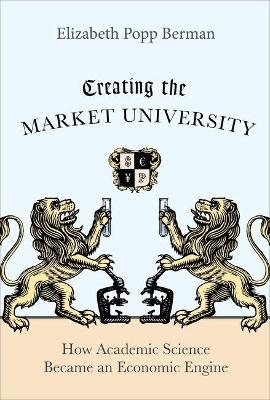
Creating the Market University
Princeton University Press (Verlag)
978-0-691-14708-6 (ISBN)
American universities today serve as economic engines, performing the scientific research that will create new industries, drive economic growth, and keep the United States globally competitive. But only a few decades ago, these same universities self-consciously held themselves apart from the world of commerce. "Creating the Market University" is the first book to systematically examine why academic science made such a dramatic move toward the market. Drawing on extensive historical research, Elizabeth Popp Berman shows how the government - influenced by the argument that innovation drives the economy - brought about this transformation. Americans have a long tradition of making heroes out of their inventors. But before the 1960s and '70s neither policymakers nor economists paid much attention to the critical economic role played by innovation. However, during the late 1970s, a confluence of events - industry concern with the perceived deterioration of innovation in the United States, a growing body of economic research on innovation's importance, and the stagnation of the larger economy - led to a broad political interest in fostering invention.
The policy decisions shaped by this change were diverse, influencing arenas from patents and taxes to pensions and science policy, and encouraged practices that would focus specifically on the economic value of academic science. By the early 1980s, universities were nurturing the rapid growth of areas such as biotech entrepreneurship, patenting, and university-industry research centers. Contributing to debates about the relationship between universities, government, and industry, "Creating the Market University" sheds light on how knowledge and politics intersect to structure the economy.
Elizabeth Popp Berman is assistant professor of sociology at the University at Albany, State University of New York.
Acknowledgments ix Chapter 1: Academic Science as an Economic Engine 1 The Changing Nature of Academic Science 4 Studying the Changes in Academic Science 8 Explaining the Rise of Market Logic in Academic Science 12 Overview of the Book 17 Chapter 2: Market Logic in the Era of Pure Science 19 Federal Funding and the Support of Science Logic 21 Using Market Logic in the 1950s and 1960s 23 Limits to the Spread of Market Logic 29 The Pillars of the Postwar System Begin to Crumble 35 The Effects of the Dissolving Federal Consensus 37 Chapter 3: Innovation Drives the Economy-an Old Idea with New Implications 40 Market-Logic Practices of the 1970s and Their Limits 42 The Political Power of an Economic Idea 44 The Innovation Frame and the University 55 Chapter 4: Faculty Entrepreneurship in the Biosciences 58 Before Biotech 60 Early Entrepreneurship 63 1978: A Turning Point 69 Academic Entrepreneurship: Money Changes Everything 76 Why Did Bioscience Entrepreneurship Take Off? 87 Chapter 5: Patenting University Inventions 94 University Patenting during the Science-Logic Era 96 Barriers to the Expansion of University Patenting 104 Innovation, the Economy, and Government Patent Policy 106 University Patenting after 1980 111 Why Did University Patenting Take Off? 114 Chapter 6: Creating University-Industry Research Centers 119 UIRCs versus Biotech Entrepreneurship and University Patenting 119 The Trajectory of University-Industry Research Centers 122 The Emergence of Federal and State Support for UIRCs 131 The Expansion of State and Federal Support for UIRCs in the 1980s 139 Why Did University-Industry Research Centers Spread? 141 Chapter 7: The Spread of Market Logic 146 The Expansion of Biotech Entrepreneurship, Patenting, and UIRCs 147 Market Logic Elsewhere in Academic Science 149 University Administrators and the Rhetoric of Innovation 154 Science Logic and Market Logic: An Uneasy Coexistence 156 Chapter 8: Conclusion 158 How Academic Science Became an Economic Engine:Considering the Evidence 159 Reconsidering Alternative Arguments 162 Speaking to Larger Conversations 167 Notes 179 Bibliography 221 Index 261
| Erscheint lt. Verlag | 8.1.2012 |
|---|---|
| Zusatzinfo | 6 line illus. 2 tables. |
| Verlagsort | New Jersey |
| Sprache | englisch |
| Maße | 152 x 235 mm |
| Gewicht | 510 g |
| Themenwelt | Naturwissenschaften |
| Sozialwissenschaften ► Pädagogik ► Erwachsenenbildung | |
| ISBN-10 | 0-691-14708-6 / 0691147086 |
| ISBN-13 | 978-0-691-14708-6 / 9780691147086 |
| Zustand | Neuware |
| Haben Sie eine Frage zum Produkt? |
aus dem Bereich


